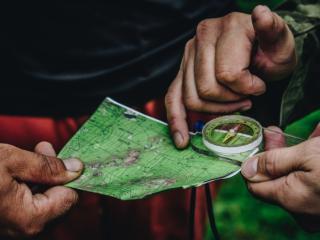Prince Marfo is the Suyani Cultural Director of Ghana. He says his government needs to do a better job of welcoming African Americans — he wants to see them welcomed as sisters and brothers not just as Americans with resources.More
Politics and History
There's a famous sequoia named General Sherman that's the biggest tree on the planet. It has its own distinctive history linked to the Civil War general and a radical anarchist group. Cultural historian Daegan Miller tells this fascinating story.More
Pardeep Singh Kaleka's father was murdered when a white supremacist attacked the Sikh temple that his father led. Remarkably, he and a former white supremacist met just two months after the massacre. Now, they work together.More
Daniel Ziblatt has watched authoritarian leaders elected in country after country – Putin in Russia, Erdogan in Turkey, Orban in Hungary, Bolsinaro in Brazil. He says there’s a playbook for how demagogues destroy their countries' democracies.More
Science journalist Sonia Shah, herself the child of Indian immigrants, has long been fascinated with the way animals, people and even microbes move. She says migration is both a crisis and an opportunity.More
Board games are a tradition for a lot of us. But have you ever thought about where those traditions come from? Producer Angelo Bautista investigates the history of mahjong.More
Examining both historical and present-day moments of widespread loneliness, philosopher Samantha Rose Hill argues we must understand our feelings of loneliness — otherwise they could be exploited to control us.More
Dave Eggers – the writer and founder of McSweeney’s – has been all over the world. Along the way, he developed his own personal code of travel ethics.More
What’s the most uncomfortable you’ve ever been on a trip? Anu Taranath is a social justice facilitator and teacher, used to having difficult conversations about race, identity and privilege. She says those are issues that come up all the time when Americans travel abroad.More
Emerging science in everything from forest ecology to the microbiome is confirming that our relationship with plants and animals is deep. Ecologist Robin Wall Kimmerer also draws on Native knowledge to explain our intimate relationships with plants.More
Lidia Yuknavitch’s apocalyptic novel “The Book of Joan” is one of the most stunning examples of climate fiction. It’s the story of a near-future where Earth is decimated and the last few survivors are stranded out in space.More
In "Our Biggest Experiment," climate advocate Alice Bell traces the history of the scientists who have been studying the impact of humanity on the climate since 1856. She tells Anne Strainchamps that science has been critical for spurring the world to act. More
When anthropologist Jason Pine traveled to rural Missouri, he wound up spending a lot of time observing underground meth labs. And he came to a startling conclusion: that the meth cooks of the Ozarks are today’s alchemists.More
Isaac Newton wrote more than a million words on alchemy over his lifetime, conducting decades of alchemical experiments. But he did it all in secret. Why? The question fascinates historian Bill Newman.More
Writer, classicist, and stand-up comic Natalie Haynes makes a strong case for reading ancient Greek and Roman literature in the modern age.More
Anne Helen Petersen has been writing about burnout long before the pandemic. Now she says we’re really starting to run on empty.More
Philosopher Lars Svendson thinks we shouldn't be stressing about learning to bake sourdough or memorize TikTok dances in quarantine. He thinks we need to learn to be lazy again.More
Historian Marcia Chatelain found a surprising connection between McDonald's and civil rights history when researching her book "Franchise: The Golden Arches in Black America." She writes about the intersection of race, capitalism and fast food.More


















